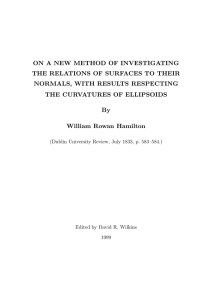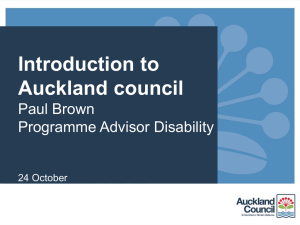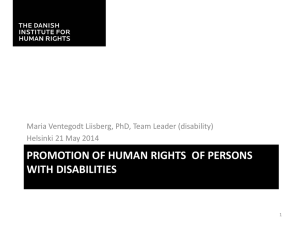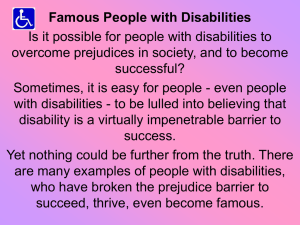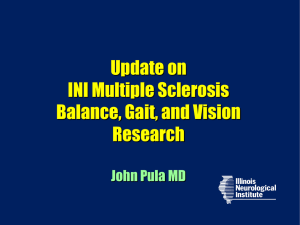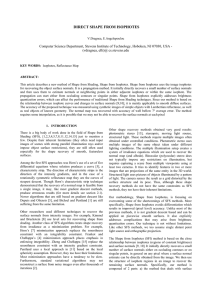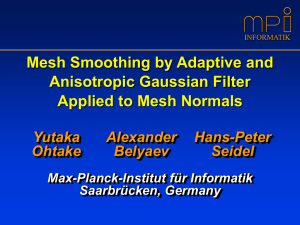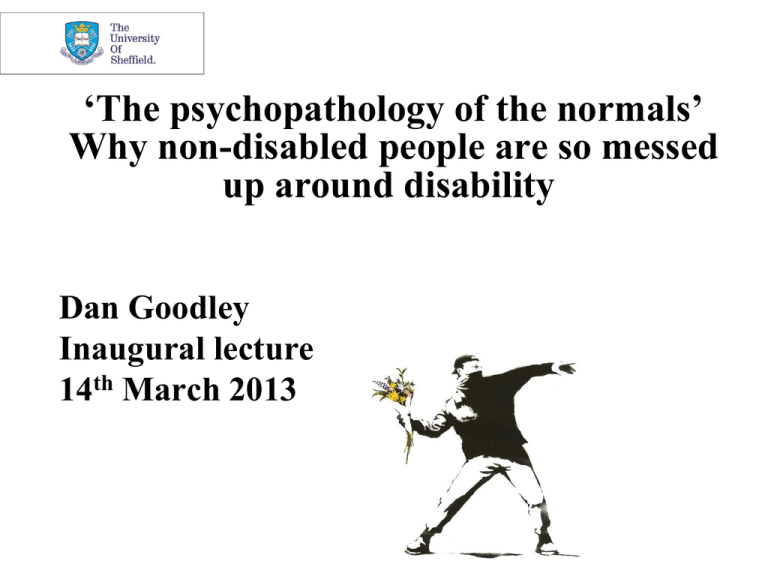
‘The psychopathology of the normals’
Why non-disabled people are so messed
up around disability
Dan Goodley
Inaugural lecture
14th March 2013
Thank you
Questions
1.Who are these ‘normals’ or ‘the nondisableds’?
2.What are their ambitions but also their
anxieties (and also, what do they look
like)?
3.How do they behave around disability
and why?
4.How can we treat them?
(1) Who are
these ‘normals’
or ‘nondisableds’?
For our purposes, then, ‘the non-disabled’ and
‘the normals’ are chosen over other synonyms
such as:
•the able-bodied (Wendell, 1989)
•the figure of normalcy (Davis, 1995)
•the normate (Garland Thomson, 2005)
•the marker of ableist normativity (Campbell,
2009).
The concept of normative
order may be fetishized
(C. Wright Mills, 1970: 36).
‘The ‘self-made man’ is a fitting
metaphor for the right, and ‘good
things happen to good people’ a
fitting motto’ (Bratlinger, 2001: 4).
The disabled person’s ‘strangeness’ can manifest
and symbolize all differences between human
beings … for the able-bodied, normal world we
are representatives of many of the things they
most fear – tragedy, loss, dark and the unknown.
Involuntarily , we walk – or more often sit – in
the valley of the shadow of death … a deformed
and paralysed body attacks everyone’s sense of
well-being and invicibility,
(Hunt, 1966:151 - 156)
‘An able body’, Davis argues, ‘is the body of a
citizen’. By contrast, ‘deformed, deafened,
amputated, obese, female, perverse, crippled,
maimed and blinded bodies do not make up the
body politic’ (Davis, 1995: 71-72). The
statistical average becomes equated with
‘average man’ – ‘L’homme moyen’ of the
statistician Quetelet who was working in the 19th
Century – typifying the expected and cherished
norms of the ruling classes of a given time.
‘normotic illness’
Bollas (1987)
(2) What are
the normals’
ambitions but
also their
anxieties? (and
what do they
look like?)
13
His same and
his many others
13
The same individual is …
… and constituted through …
Cognitively, socially and emotionally able and
competent
Disabling society (Oliver, 1990; 1996) or ableist
society (Campbell, 2008a, 2008b, 2009)
Biologically and psychologically stable, genetically Societies governed by bio and thanatopolitics
sound and ontologically responsible
(Rose, 2001); technology (Lash, 2001), new
eugenics and Human Genome Project (Davis,
2002).
Normal: Sane, autonomous, self-sufficient,
reasonable, law abiding and economically viable
Mentalism and sanism (Chamberlin, 1990; Lewis,
2008); normalcy (Davis, 1995), normate culture
(Garland-Thomson, 1996; Michalko, 2002),
normative mobility (Shuttleworth, 2002),
normalising society (Tremain, 2005a); neurotic
society (Marks, 1999a; Olkin and Pledger, 2003);
meritocracy (Fukushima, 2009); entrepreneurial
society (Masschelein and Simons, 2005)
White, heterosexual, male, adult, living in towns,
global citizen of WENA
Heteronormativity (Sherry, 2004); occidentalism
(Venn, 2001), colonialism (Fanon, 1993); selfcontained individualism (Sampson, 1977, 1985,
1988, 1993); patriarchy, malestream and
phallocentric society (Hare Mustin and Marecek,
1992); compulsory heterosexuality, masculinity and
M
ablebodiedness (e.g. Rich, 1987; Connell, 2002; M
U
McRuer, 2006)
15
1920s North American Eugenics Pamphlet
4/13/2015
Normals hunt in
pairs
Normals hunt in
packs
The normal is
unfaithful
The normal is
unfaithful
The normal is
unfaithful
The normal had a
mullet
The normal worries
about not being
normal enough
The normal deals with his
own normate failings by
finding failure in others
Some normals make a
career out of finding
failure in others
Some normals make a
career out of finding
failure in others
Some normals make a
career out of finding
failure in others
Some normals make a
career out of finding
failure in others
Many normals have a
problem with ways of life
unlike their own
Many normal
establishments police their
borders carefully
Many normal
establishments police their
borders carefully
Many normal
establishments police their
borders carefully
Googling ‘normal man’ can offer
some nice surprises
Nndr 2011
32
(3) How
do
they
behave
around
disability
and why?
34
• ESRC project, ‘Does every child matter,
post Blair? The interconnections of
disabled childhoods’ with Dr Katherine
Runswick Cole
• http://www.rihsc.mmu.ac.uk/postblairproject
/
• What is it like to grow up as a disabled child
in Post-Blair England?
35
Goodley and Lawthom
(2005).(eds). Disability
and psychology
London: Plagrave.
36
McLaughlin, J., Goodley,
D., Clavering, E.,
Tregaskis, C.
and
Fisher, P.
(2008). Families
with disabled children:
values of enabling care and
social justice.
London: Palgrave
Macmillan.
37
Goodley (2011).
Disability Studies: An
interdisciplinary
introduction.
London: Sage.
An email
In October and November 2011 (DISABILITYRESEARCH@JISCMAIL.AC.UK)
Comrades
I am writing a slightly tongue in cheek (as you can tell by the working title) but
also, I hope, serious, article exploring non-disabled people’s reaction to disability.
I would like to collect stories from list members about non-disabled people’s
verbal or other responses to disability that you have witnessed. In writing the
article I will be making clear that not all non-disabled people engage in such
responses, that many non-disabled people are allies, friends, supporters and
parents of disabled people and that we are all marked by differences associated
with class, gender, age, sexuality, ethnicity, etc. Moreover, of course, what counts
as non/disabled is open to debate. However, I do want the article to expose,
hopefully explain and also challenge some of the common reactions of nondisabled society to disability.
Data Analysis
Social psychoanalytic disability studies
Contradictions …
Apotemnophobia (fear of persons with
amputations)
Scotomaphobia (fear of blindness in visual field)
Psellismophobia (fear of stuttering)
(http://phobialist.com/).
The
uncanny
45
Nndr 2011
disavowal
(1) Intimate invitations
sex
(2) Charitable donations
(3) Ontological invalidation: putting the 'dis'
in disability
(4) Disability kitsch and common parlance
(3) Disability kitsch and common
parlance
(4) How can we treat
them?
Spread the word about disability activism
Therapy for the normals.
Michele Donald
Therapist
Michele Donald
Celebrating our potential to be abnormal
http://www.touretteshero.com/
Celebrating our potential to be abnormal
Welcome to the
gallery. Every picture
is inspired by a tic,
and each one’s been
created by a member
of the site.
‘I’m making biscuits out of crack cocaine and marzipan’

